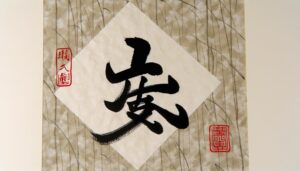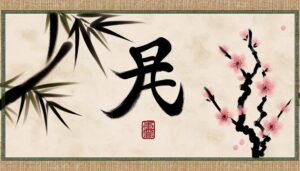Writing Chinese Symbols for Loyalty and Respect: Step-by-Step Guide
The Chinese characters for loyalty (忠, zhōng) and respect (敬, jìng) carry profound historical and cultural significance. Loyalty, symbolized by the combination of 'center' and 'heart,' underscores heartfelt dedication central to Confucian ideals and societal structure.
Respect, merging 'meticulous' and 'action,' emphasizes conscientious conduct and reverence for tradition. Both virtues have been historically paramount in shaping interpersonal relationships, governance, and social stability in Chinese society.
The meticulous brush strokes in calligraphy further reflect these values, conveying depth and sincerity in every line. To fully grasp their intricate cultural meanings, one must appreciate their roots in philosophy and daily practices.
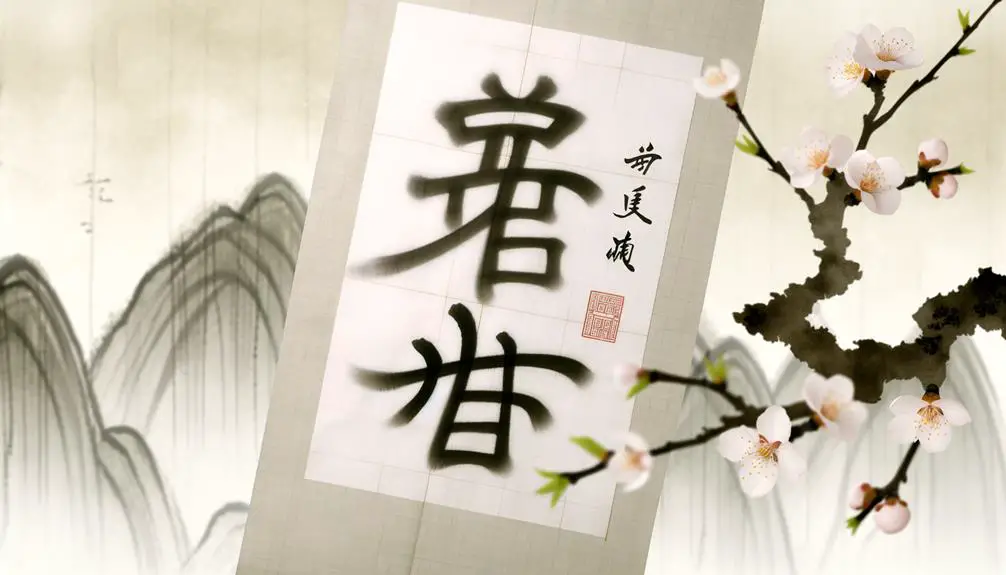
Key Takeaways
- The Chinese character for loyalty (忠) combines 'center' (中) and 'heart' (心), symbolizing heartfelt dedication.
- The Chinese character for respect (敬) merges 'meticulous' and 'action,' highlighting conscientious behavior driven by deep regard.
- Loyalty (忠) and respect (敬) are foundational virtues in Confucianism, emphasizing family, ruler, and community allegiance.
- Calligraphy of loyalty and respect uses meticulous brush strokes to convey profound cultural values.
- In modern China, loyalty and respect continue to shape family dynamics, business practices, and social harmony.
Historical Origins
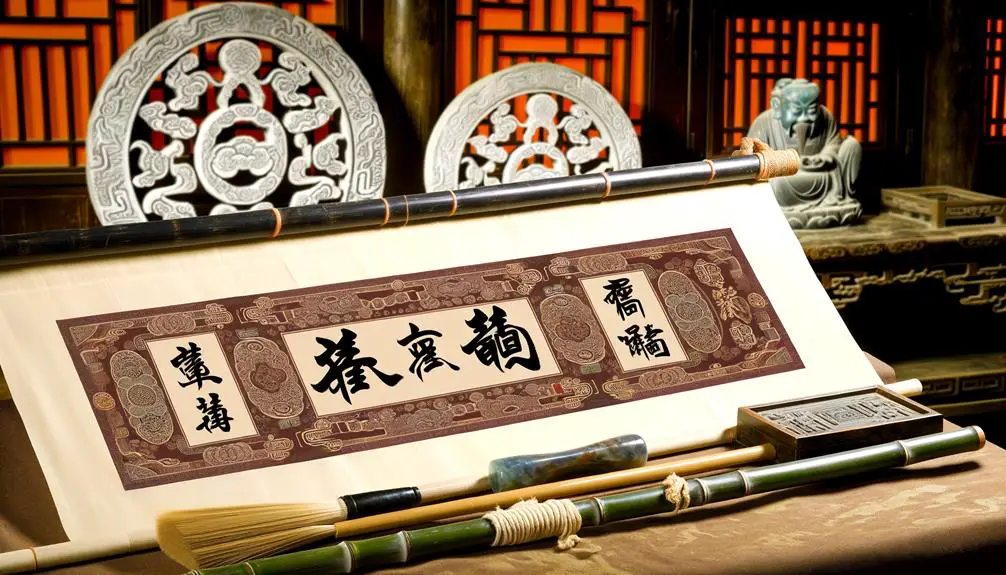
The historical origins of the Chinese symbols for loyalty (忠) and respect (敬) can be traced back to ancient Chinese philosophy and governance, where these virtues were foundational to societal structure and interpersonal relationships.
Loyalty was deeply embedded in Confucian teachings, emphasizing fidelity to one's family, ruler, and community. Respect was similarly central, manifesting in the reverence for elders, tradition, and hierarchical order. These principles were not mere abstract ideals but practical tenets that shaped laws, rituals, and everyday conduct.
In governance, loyalty guaranteed allegiance to the sovereign, fostering political stability. Respect, meanwhile, underpinned social harmony by promoting courteous interactions and adherence to societal norms. Together, they cultivated a coherent social fabric, essential for the enduring legacy of Chinese civilization.
Linguistic Breakdown
How do the characters for loyalty (忠) and respect (敬) encapsulate their profound meanings through their intricate linguistic composition?
The character 忠 combines the elements 中 (center) and 心 (heart), emphasizing the centrality of heartfelt dedication, signifying unwavering allegiance.
Respect (敬) merges the components 苟 (meticulous) and 攵 (action), highlighting the conscientious actions driven by deep regard.
This character underscores the importance of deliberate, respectful conduct.
Both characters are steeped in cultural values, reflecting Confucian ideals that prioritize inner sincerity and outward ethical behavior.
Their structural elements, when combined, create a rich tapestry of meaning that transcends mere words, embodying the core virtues essential to harmonious social relationships.
Symbolism in Calligraphy
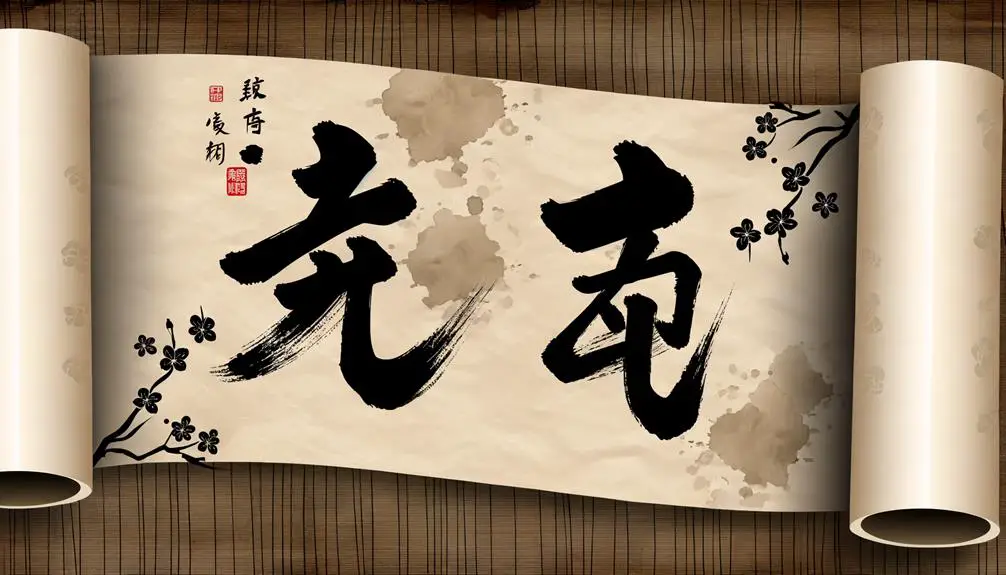
The art of calligraphy in Chinese culture holds profound significance, characterized by historical techniques that convey deep symbolic meaning.
Each brush stroke is meticulously crafted, not only to form characters but also to express values such as loyalty and respect.
These symbolic brush strokes embody centuries of tradition, where the technique and style of writing enhance the inherent meaning of the words inscribed.
Historical Calligraphy Techniques
Mastery of ancient Chinese calligraphy techniques reveals profound layers of symbolism, particularly in the depiction of virtues such as loyalty and respect. Historically, calligraphers employed a meticulous approach, where each stroke was imbued with meaning.
The choice of script style—whether Seal, Clerical, Regular, Semi-cursive, or Cursive—communicated different nuances. For instance, Regular Script, with its balanced and clear strokes, often symbolized steadfastness and reliability, aligning with the virtue of loyalty.
Additionally, the spatial arrangement and rhythm within the calligraphy piece contributed to the overall expression of respect. These techniques were not merely aesthetic choices but were deeply intertwined with cultural and philosophical ideals, encapsulating the essence of the virtues they aimed to portray.
Symbolic Brush Strokes
Understanding the symbolic significance of individual brush strokes in Chinese calligraphy illuminates how the virtues of loyalty and respect are intricately woven into the fabric of each character. Each stroke carries profound meaning, reflecting the calligrapher's intention and emotional state.
The horizontal stroke, or 'heng,' symbolizes steadfastness and stability, echoing the unwavering nature of loyalty. The vertical stroke, or 'shu,' represents strength and integrity, essential aspects of respect.
The meticulous execution of these strokes requires discipline and mindfulness, underscoring the importance of these virtues in both the art form and the culture it represents. Therefore, the act of writing itself becomes a meditative practice, reinforcing the calligrapher's commitment to embodying loyalty and respect.
Loyalty in Chinese Culture
Loyalty in Chinese culture is a multifaceted concept deeply rooted in historical significance, where loyalty to the emperor was paramount and often intertwined with Confucian ideals.
Family bonds also play a vital role, with filial piety being a central tenet that emphasizes unwavering loyalty and respect within the familial hierarchy.
Additionally, loyalty extends into social hierarchies, reinforcing societal stability and cohesion by promoting trust and dependability in interpersonal relationships.
Historical Significance
Tracing its roots back to ancient dynasties, the concept of loyalty has been a cornerstone in Chinese culture, profoundly influencing social and political structures throughout history. Loyalty was not merely a personal virtue but a binding societal expectation, integral to maintaining harmony and order within the empire.
This focus on loyalty is evident through various historical epochs, such as:
- Confucian Teachings: Emphasized loyalty to one's ruler and family.
- Feudal System: Required vassals' unwavering loyalty to their lords.
- Imperial Edicts: Mandated loyalty as an essential trait for governance.
- Literature and Folklore: Celebrated stories of loyal warriors and officials.
These facets underscore how deeply loyalty was embedded in Chinese ethos, acting as an essential mechanism for societal cohesion.
Family Bonds
In Chinese culture, the family unit stands as a fundamental pillar, with loyalty to family members regarded as a paramount virtue that strengthens familial bonds and upholds social harmony.
This deep-rooted loyalty manifests in various aspects, from filial piety to the collective prioritization of family welfare over individual desires. Embedded in Confucian teachings, the concept of loyalty extends beyond mere obligation, fostering mutual respect and interdependence among family members.
Such loyalty is not static but evolves as family roles shift over time, adapting to contemporary societal changes while maintaining its core values. This enduring commitment to family is instrumental in preserving cultural continuity and reinforcing the intricate network of relationships that define Chinese social structure.
Social Hierarchies
Beyond the confines of the family unit, loyalty in Chinese culture also intricately intertwines with the fabric of social hierarchies, shaping interactions and reinforcing the underlying structure of society. This deep-seated loyalty manifests in various ways, permeating diverse social strata and institutional frameworks.
Key aspects include:
- Confucian Influence: Loyalty to superiors and elders is emphasized, reflecting Confucian principles.
- Guanxi Networks: Personal relationships and networks, known as 'guanxi', are pivotal, fostering mutual loyalty and trust.
- Workplace Dynamics: Employees often exhibit loyalty to their employers, enhancing organizational stability and cohesion.
- Political Allegiance: Loyalty to the state and its leaders is cultivated, contributing to societal harmony and unity.
Understanding these dimensions is essential for comprehending the pervasive role of loyalty within Chinese social hierarchies.
Respect in Chinese Society

Respect in Chinese society is deeply rooted in historical traditions and cultural norms that influence interpersonal relationships and social behavior. The emphasis on respect manifests in various aspects of daily life, from family interactions to professional settings. This respect is often demonstrated through specific rituals, language use, and behavioral expectations.
| Aspect | Manifestation | Cultural Significance |
|---|---|---|
| Family | Filial piety (孝) | Upholds family harmony and duty |
| Professional | Hierarchical deference | Maintains workplace order |
| Social | Politeness in communication | Fosters mutual respect and harmony |
Understanding these manifestations provides insight into how respect shapes social dynamics in China. The value placed on respect guarantees a cohesive and harmonious society, reinforcing both individual and collective responsibilities.
Influence on Relationships
The deeply ingrained cultural norms of respect in Chinese society greatly influence both personal and professional relationships, shaping interactions and expectations. This cultural ethos manifests in various ways:
- Hierarchy: Respect for elders and superiors is paramount, affecting decision-making and communication.
- Harmony: Emphasis on avoiding conflict assures that relationships are maintained smoothly, prioritizing collective well-being.
- Reciprocity: Mutual respect fosters loyalty, where actions and favors are expected to be returned, strengthening bonds over time.
- Deference: Politeness and courteous behavior are standard, reflecting a deep-seated cultural appreciation for respect.
These elements underscore the importance of understanding and integrating respect and loyalty into everyday interactions, fostering trust and cooperation in various spheres of life.
The intricate balance of these values contributes to the stability and cohesiveness of Chinese social structures.
Role in Governance
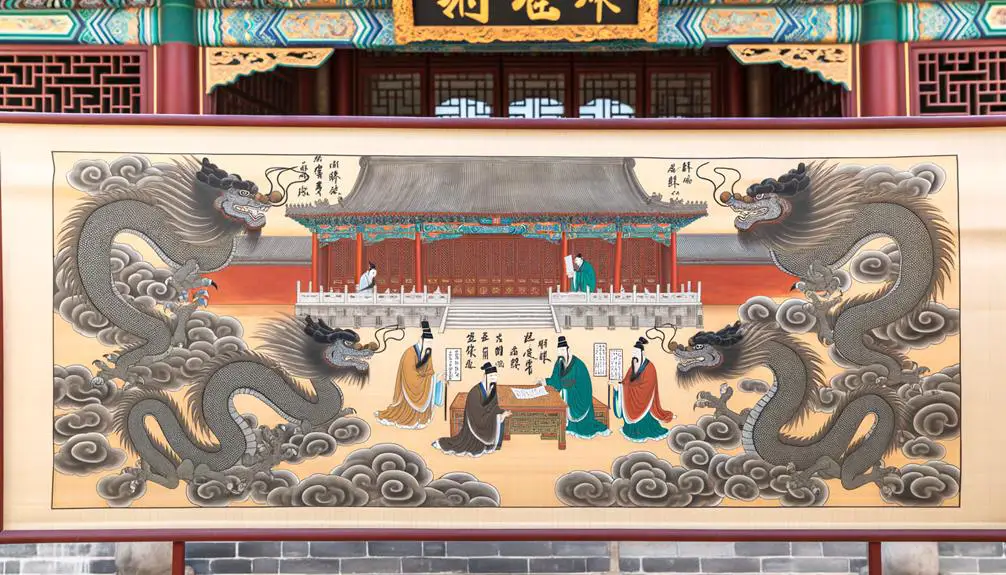
In Chinese governance, the principles of loyalty and respect are integral to maintaining political stability and effective leadership. Historically, these values have been foundational in securing the allegiance of officials to their superiors and the state. Loyalty fosters a cohesive administration, reducing the risk of dissent, while respect cultivates a culture of mutual regard between leaders and subordinates, enhancing collaborative efforts.
| Principle | Impact on Governance |
|---|---|
| Loyalty | Secures allegiance and cohesive administration |
| Respect | Cultivates mutual regard and collaboration |
The symbiotic relationship between loyalty and respect underpins Confucian ideals, which emphasize hierarchical order and moral integrity. This framework has shaped governance structures, promoting a disciplined and morally upright bureaucracy, essential for societal harmony and efficient governance.
Modern-Day Relevance
Amidst rapid modernization and globalization, the principles of loyalty and respect continue to hold significant relevance in contemporary Chinese society. These values, deeply rooted in Confucian teachings, permeate various facets of daily life and social interactions. Their importance is evident in:
- Family Dynamics: Loyalty to family and respect for elders are fundamental.
- Business Practices: Trust and mutual respect guide business relationships.
- Education: Students are taught to honor their teachers and value knowledge.
- Social Harmony: These principles underpin community cohesion and societal stability.
In essence, loyalty and respect are not merely traditional concepts but active, guiding principles that shape behaviors and relationships in modern China. Their enduring presence underscores their adaptability and essential role in the cultural fabric.
Global Influence
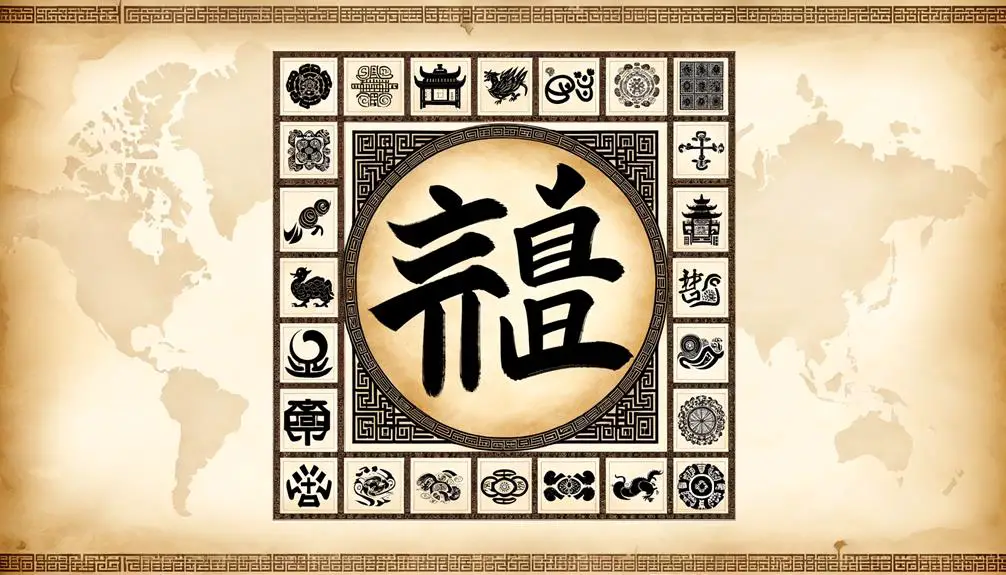
Across international borders, the principles of loyalty and respect inherent in Chinese culture have begun to influence global perspectives on interpersonal and professional relationships. These values, deeply embedded in Chinese society, are increasingly recognized for their potential to enhance workplace cohesion and social harmony. Corporations and educational institutions worldwide are integrating these principles into their frameworks, aiming to foster more collaborative environments.
| Aspect | Influence on Global Practices |
|---|---|
| Corporate Governance | Emphasis on team loyalty |
| Educational Systems | Respect for teachers and peers |
| Diplomatic Relations | Long-term mutual respect |
| Community Engagement | Stronger communal bonds |
| Leadership Styles | Focus on ethical leadership |
These shifts underscore the growing appreciation for cultural wisdom that transcends geographical boundaries, enriching diverse societal contexts.
Conclusion
The Chinese symbols for loyalty (忠) and respect (敬) serve as enduring pillars in cultural, social, and political contexts. Their historical origins and linguistic intricacies, much like the intricate brushstrokes in calligraphy, reveal deep-rooted values that continue to shape interpersonal and societal dynamics.
These symbols, integral to governance and personal relationships, maintain relevance in modern China and resonate globally, illustrating a timeless commitment to ethical principles akin to the steadfast flow of a river through time.

